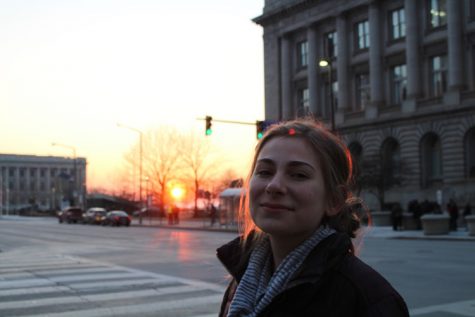No Rapport for Reporters
Oct 3, 2019
Fake news. Sensationalism. Muckraking. Yellow journalism.
I associated journalism with these concepts before writing a news story. I don’t think it’s uncommon to view reality through a constructed lens. In fact, I think it’s impossible to escape, seeing that I entered college armed with a 12-pack of chicken-flavored Ramen noodles and enough coffee to make a Doomsday prepper jealous. These “essentials” weren’t deemed by me as such, but rather by society. I bought the soup and coffee because I thought that’s what a college kid did. That’s how it’s depicted in the movies, at least.
So, it shouldn’t come as a shock that my understanding of journalism was one polluted by misconceptions, popular beliefs and pervasive negative political phrases.
This changed, however, when I randomly took a journalism class my freshman year. For the class, I covered my first major event: the University Heights mayoral election.
I had been studying journalism for a few weeks, and learning the basics–how to be an ethical writer, how to interview a subject, how to properly craft a lead and how to write a compelling, factual narrative. My studies provided a solid foundation as I entered City Hall to observe a council meeting, but they did not prepare me for the fast-paced and aggressive environment I was expected to navigate.
Long-standing Mayor Susan Infeld was contested by newcomer and favored candidate Michael Brennan. After a few minutes of observing the proceedings, it was obvious that the majority of council members preferred Brennan.
Armed with this deduction and, to be honest, quite pleased with myself for understanding the subtext of the meeting, I started asking questions.
Immediately, I was met with intense skepticism and distrust. Both council and audience members did not focus on my questions, they focused on my loyalties. It was assumed that I favored one candidate or the other.
Not only was this disheartening, it made my job extremely difficult. Little did I know, this was merely a glimpse into the challenges that reporters face.
Since the mayoral election, I have covered a panicked John Carroll Community after the announcement of academic prioritization, the cancellation of the drag show, and voter fraud within Student Government. I’ve also covered Jesse McCartney’s concert and many other relatively high-profile stories.
Each came with a unique set of challenges, but they all had one thing in common: someone was mad at me, and they made sure I knew it.
On multiple occasions, I have been accosted while walking to class or eating in the cafeteria. In these capacities, I am just trying to be a student.
I always welcome constructive criticism, but when faculty members blame me for the tension between students and administrators, question my ability to be objective or blatantly assume my position on issues, incorrectly I might add, I get a little frustrated.
Let me make this clear: I am not out to get anyone. I am not working for someone else’s agenda nor am I conspiring with any malicious misinformation campaign that seeks to attack valued members of our community.
I am reporting. I am hearing about stories and pursuing them to the best of my ability, just as I was when I was refused an audience with President Michael Johnson two and a half weeks ago.
Again, I was acting as a reporter and classified as such by the staff of the president’s office. Though I had five hours set aside to wait for an interview, I was told to leave within 20 minutes.
Furthermore, those 20 minutes had been dedicated, at least by the administrative assistant, to getting me out of there. In the end, Johnson appeared and told me multiple times that he would not grant me an interview.
When I left, I was fuming.
I had never been treated like that before. My instincts told me to walk right back in there, but I decided to play it safe in an attempt to maintain a relationship with the Office of the President.
Time and time again, I have been treated as the enemy, and each time it comes as a shock; I am not what most would consider an intimidating presence.
I can ask difficult questions, but I’m a five-foot-tall blonde girl who wears a lot of florals. I am not normally classified as a threat — or I wasn’t until I started practicing journalism.
People see a reporter and become defensive. Whether this can be attributed to John Carroll’s unique relationship with the press or to the nation’s current view of news media, I cannot say.
I can only communicate my story, my shock and my disappointment in the disbelief that I am trying to work for the good of all.












